Organisational Behaviour Report: Influence on BBC Performance
VerifiedAdded on 2020/10/22
|13
|4017
|112
Report
AI Summary
This report provides a comprehensive analysis of organisational behaviour within the British Broadcasting Corporation (BBC). It delves into the influence of culture, politics, and power dynamics, examining how these factors impact employee behaviour and organisational performance. The report explores various organisational cultures, including power, role, task, and person cultures, and analyses the effects of different power structures, such as legitimate, reward, expert, referent, and coercive power. Additionally, it evaluates content and process theories of motivation, specifically Maslow's need hierarchy theory and Vroom's expectancy theory, to understand how these theories can be applied to enhance employee motivation and productivity. The report also discusses different types of teams, including functional, problem-solving, and project teams, and their roles in achieving organisational objectives. The analysis includes an examination of how the BBC has addressed issues such as gender inequality and employee motivation, and how organisational behaviour concepts can be applied to improve overall performance. This report, contributed by a student, is available on Desklib, a platform offering AI-powered study tools and resources for students.
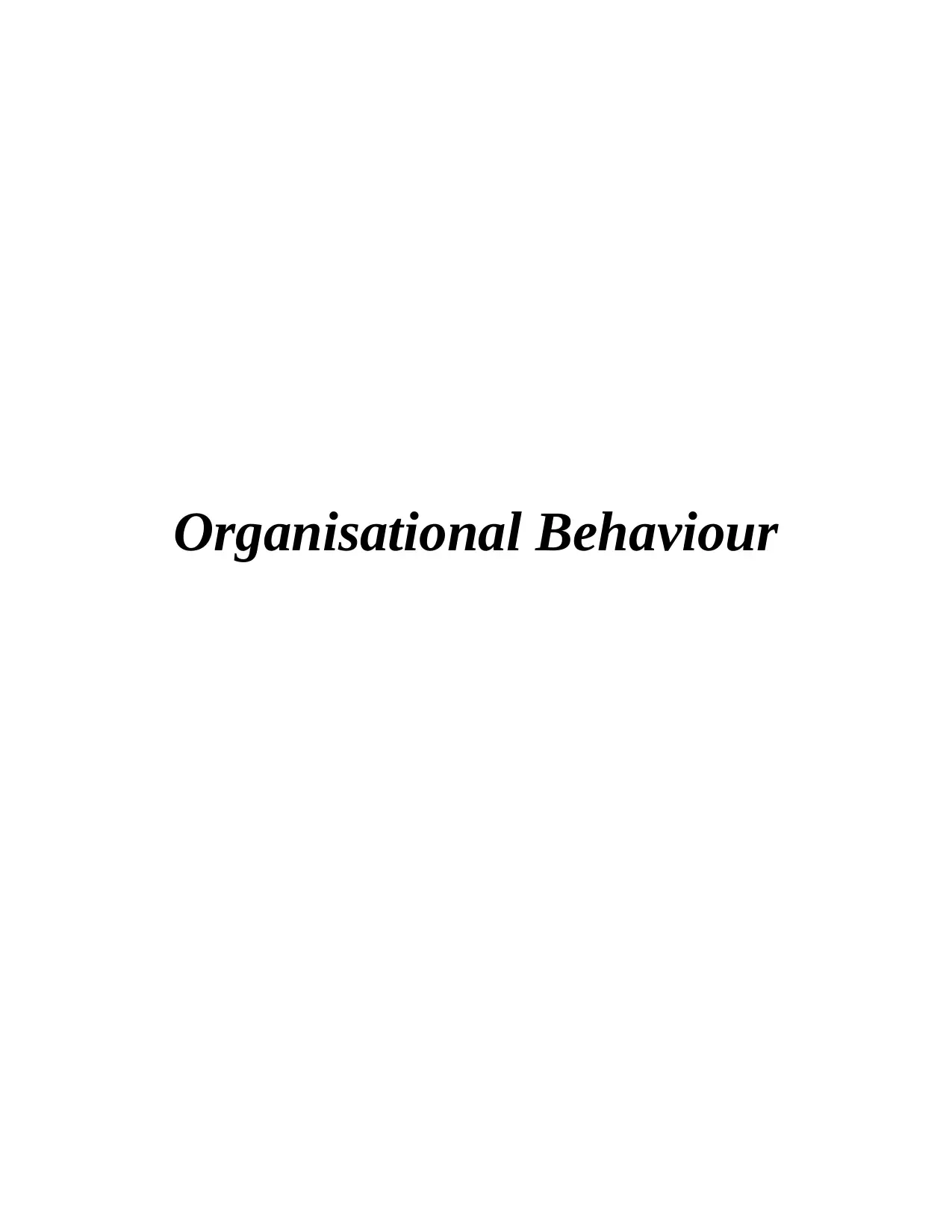
Organisational Behaviour
Paraphrase This Document
Need a fresh take? Get an instant paraphrase of this document with our AI Paraphraser
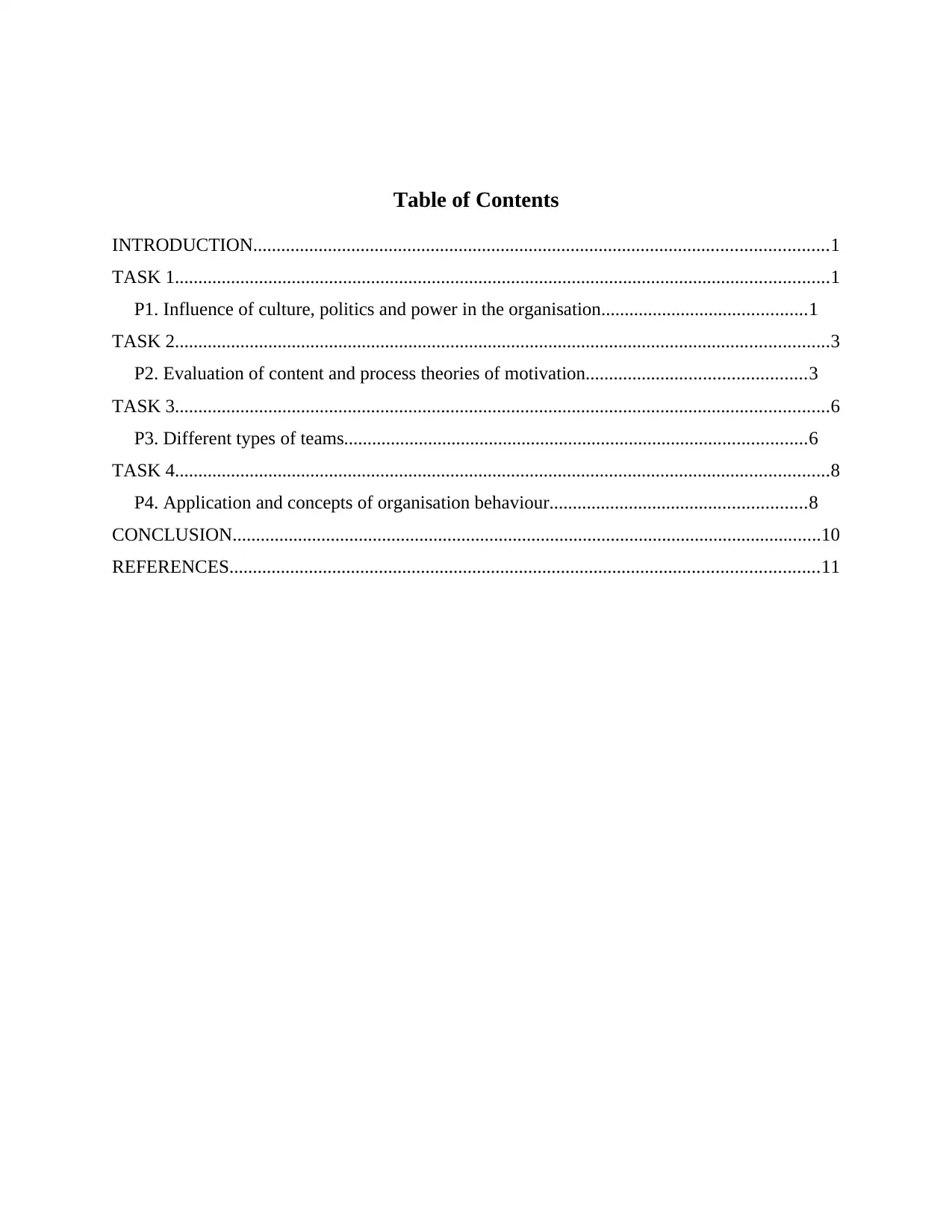
Table of Contents
INTRODUCTION...........................................................................................................................1
TASK 1............................................................................................................................................1
P1. Influence of culture, politics and power in the organisation............................................1
TASK 2............................................................................................................................................3
P2. Evaluation of content and process theories of motivation...............................................3
TASK 3............................................................................................................................................6
P3. Different types of teams...................................................................................................6
TASK 4............................................................................................................................................8
P4. Application and concepts of organisation behaviour.......................................................8
CONCLUSION..............................................................................................................................10
REFERENCES..............................................................................................................................11
INTRODUCTION...........................................................................................................................1
TASK 1............................................................................................................................................1
P1. Influence of culture, politics and power in the organisation............................................1
TASK 2............................................................................................................................................3
P2. Evaluation of content and process theories of motivation...............................................3
TASK 3............................................................................................................................................6
P3. Different types of teams...................................................................................................6
TASK 4............................................................................................................................................8
P4. Application and concepts of organisation behaviour.......................................................8
CONCLUSION..............................................................................................................................10
REFERENCES..............................................................................................................................11
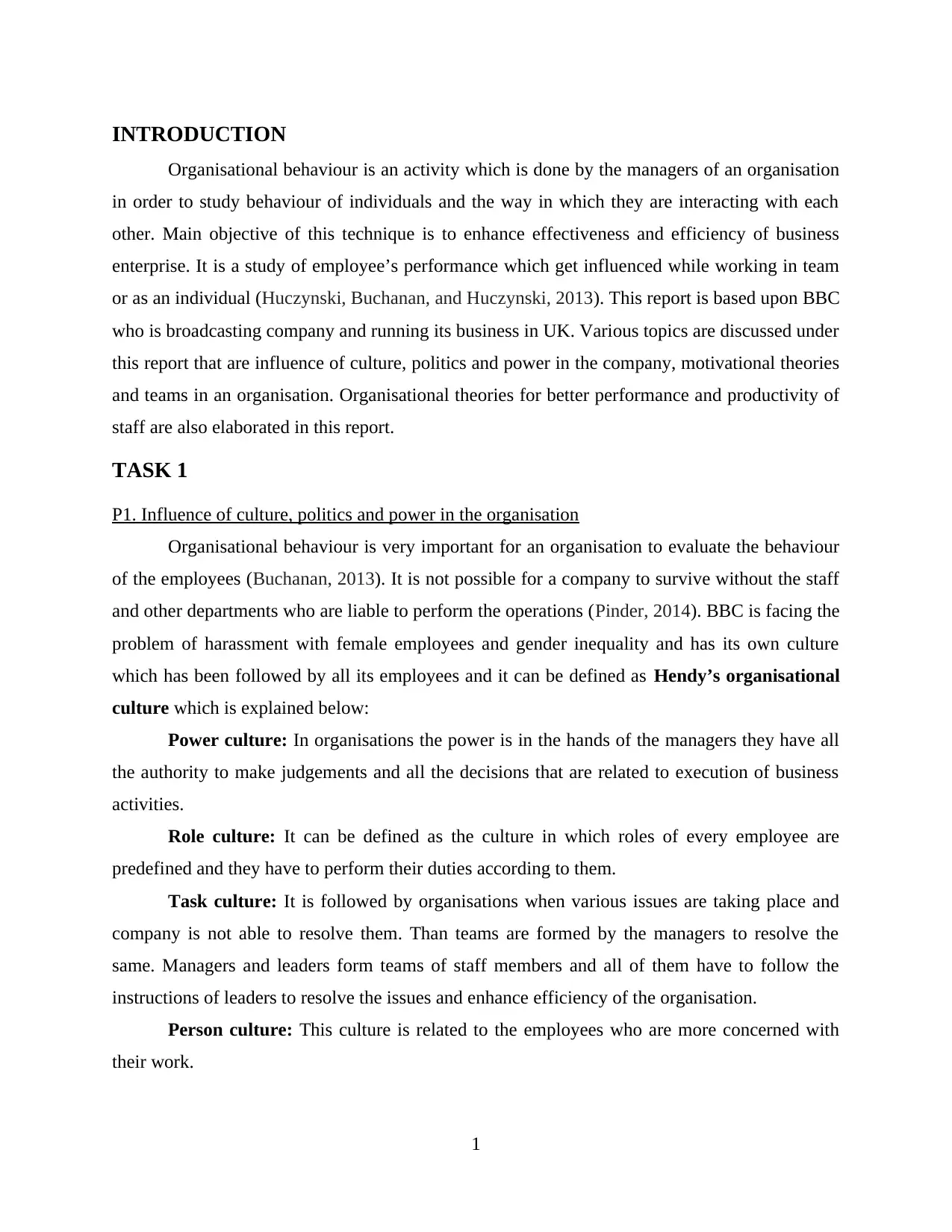
INTRODUCTION
Organisational behaviour is an activity which is done by the managers of an organisation
in order to study behaviour of individuals and the way in which they are interacting with each
other. Main objective of this technique is to enhance effectiveness and efficiency of business
enterprise. It is a study of employee’s performance which get influenced while working in team
or as an individual (Huczynski, Buchanan, and Huczynski, 2013). This report is based upon BBC
who is broadcasting company and running its business in UK. Various topics are discussed under
this report that are influence of culture, politics and power in the company, motivational theories
and teams in an organisation. Organisational theories for better performance and productivity of
staff are also elaborated in this report.
TASK 1
P1. Influence of culture, politics and power in the organisation
Organisational behaviour is very important for an organisation to evaluate the behaviour
of the employees (Buchanan, 2013). It is not possible for a company to survive without the staff
and other departments who are liable to perform the operations (Pinder, 2014). BBC is facing the
problem of harassment with female employees and gender inequality and has its own culture
which has been followed by all its employees and it can be defined as Hendy’s organisational
culture which is explained below:
Power culture: In organisations the power is in the hands of the managers they have all
the authority to make judgements and all the decisions that are related to execution of business
activities.
Role culture: It can be defined as the culture in which roles of every employee are
predefined and they have to perform their duties according to them.
Task culture: It is followed by organisations when various issues are taking place and
company is not able to resolve them. Than teams are formed by the managers to resolve the
same. Managers and leaders form teams of staff members and all of them have to follow the
instructions of leaders to resolve the issues and enhance efficiency of the organisation.
Person culture: This culture is related to the employees who are more concerned with
their work.
1
Organisational behaviour is an activity which is done by the managers of an organisation
in order to study behaviour of individuals and the way in which they are interacting with each
other. Main objective of this technique is to enhance effectiveness and efficiency of business
enterprise. It is a study of employee’s performance which get influenced while working in team
or as an individual (Huczynski, Buchanan, and Huczynski, 2013). This report is based upon BBC
who is broadcasting company and running its business in UK. Various topics are discussed under
this report that are influence of culture, politics and power in the company, motivational theories
and teams in an organisation. Organisational theories for better performance and productivity of
staff are also elaborated in this report.
TASK 1
P1. Influence of culture, politics and power in the organisation
Organisational behaviour is very important for an organisation to evaluate the behaviour
of the employees (Buchanan, 2013). It is not possible for a company to survive without the staff
and other departments who are liable to perform the operations (Pinder, 2014). BBC is facing the
problem of harassment with female employees and gender inequality and has its own culture
which has been followed by all its employees and it can be defined as Hendy’s organisational
culture which is explained below:
Power culture: In organisations the power is in the hands of the managers they have all
the authority to make judgements and all the decisions that are related to execution of business
activities.
Role culture: It can be defined as the culture in which roles of every employee are
predefined and they have to perform their duties according to them.
Task culture: It is followed by organisations when various issues are taking place and
company is not able to resolve them. Than teams are formed by the managers to resolve the
same. Managers and leaders form teams of staff members and all of them have to follow the
instructions of leaders to resolve the issues and enhance efficiency of the organisation.
Person culture: This culture is related to the employees who are more concerned with
their work.
1
⊘ This is a preview!⊘
Do you want full access?
Subscribe today to unlock all pages.

Trusted by 1+ million students worldwide
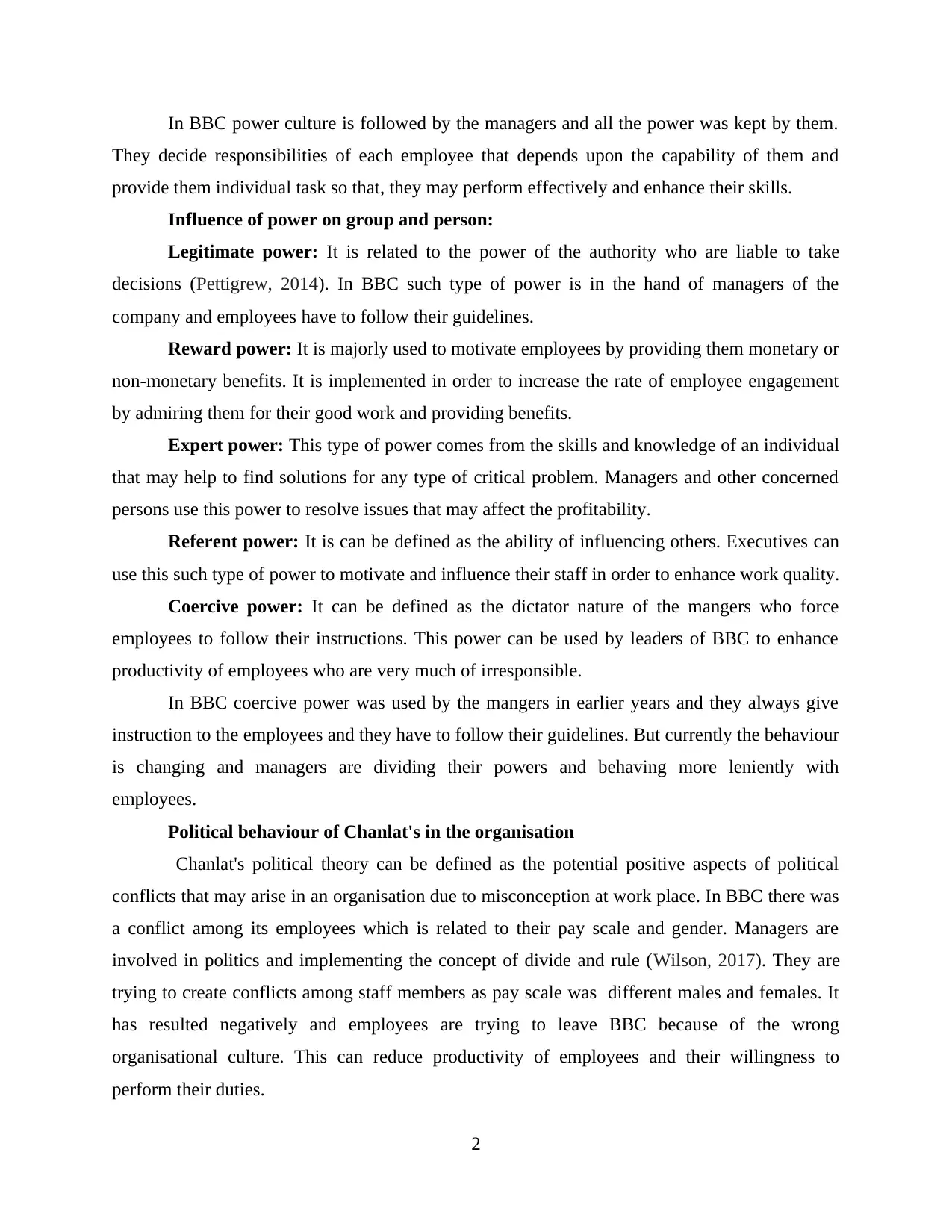
In BBC power culture is followed by the managers and all the power was kept by them.
They decide responsibilities of each employee that depends upon the capability of them and
provide them individual task so that, they may perform effectively and enhance their skills.
Influence of power on group and person:
Legitimate power: It is related to the power of the authority who are liable to take
decisions (Pettigrew, 2014). In BBC such type of power is in the hand of managers of the
company and employees have to follow their guidelines.
Reward power: It is majorly used to motivate employees by providing them monetary or
non-monetary benefits. It is implemented in order to increase the rate of employee engagement
by admiring them for their good work and providing benefits.
Expert power: This type of power comes from the skills and knowledge of an individual
that may help to find solutions for any type of critical problem. Managers and other concerned
persons use this power to resolve issues that may affect the profitability.
Referent power: It is can be defined as the ability of influencing others. Executives can
use this such type of power to motivate and influence their staff in order to enhance work quality.
Coercive power: It can be defined as the dictator nature of the mangers who force
employees to follow their instructions. This power can be used by leaders of BBC to enhance
productivity of employees who are very much of irresponsible.
In BBC coercive power was used by the mangers in earlier years and they always give
instruction to the employees and they have to follow their guidelines. But currently the behaviour
is changing and managers are dividing their powers and behaving more leniently with
employees.
Political behaviour of Chanlat's in the organisation
Chanlat's political theory can be defined as the potential positive aspects of political
conflicts that may arise in an organisation due to misconception at work place. In BBC there was
a conflict among its employees which is related to their pay scale and gender. Managers are
involved in politics and implementing the concept of divide and rule (Wilson, 2017). They are
trying to create conflicts among staff members as pay scale was different males and females. It
has resulted negatively and employees are trying to leave BBC because of the wrong
organisational culture. This can reduce productivity of employees and their willingness to
perform their duties.
2
They decide responsibilities of each employee that depends upon the capability of them and
provide them individual task so that, they may perform effectively and enhance their skills.
Influence of power on group and person:
Legitimate power: It is related to the power of the authority who are liable to take
decisions (Pettigrew, 2014). In BBC such type of power is in the hand of managers of the
company and employees have to follow their guidelines.
Reward power: It is majorly used to motivate employees by providing them monetary or
non-monetary benefits. It is implemented in order to increase the rate of employee engagement
by admiring them for their good work and providing benefits.
Expert power: This type of power comes from the skills and knowledge of an individual
that may help to find solutions for any type of critical problem. Managers and other concerned
persons use this power to resolve issues that may affect the profitability.
Referent power: It is can be defined as the ability of influencing others. Executives can
use this such type of power to motivate and influence their staff in order to enhance work quality.
Coercive power: It can be defined as the dictator nature of the mangers who force
employees to follow their instructions. This power can be used by leaders of BBC to enhance
productivity of employees who are very much of irresponsible.
In BBC coercive power was used by the mangers in earlier years and they always give
instruction to the employees and they have to follow their guidelines. But currently the behaviour
is changing and managers are dividing their powers and behaving more leniently with
employees.
Political behaviour of Chanlat's in the organisation
Chanlat's political theory can be defined as the potential positive aspects of political
conflicts that may arise in an organisation due to misconception at work place. In BBC there was
a conflict among its employees which is related to their pay scale and gender. Managers are
involved in politics and implementing the concept of divide and rule (Wilson, 2017). They are
trying to create conflicts among staff members as pay scale was different males and females. It
has resulted negatively and employees are trying to leave BBC because of the wrong
organisational culture. This can reduce productivity of employees and their willingness to
perform their duties.
2
Paraphrase This Document
Need a fresh take? Get an instant paraphrase of this document with our AI Paraphraser
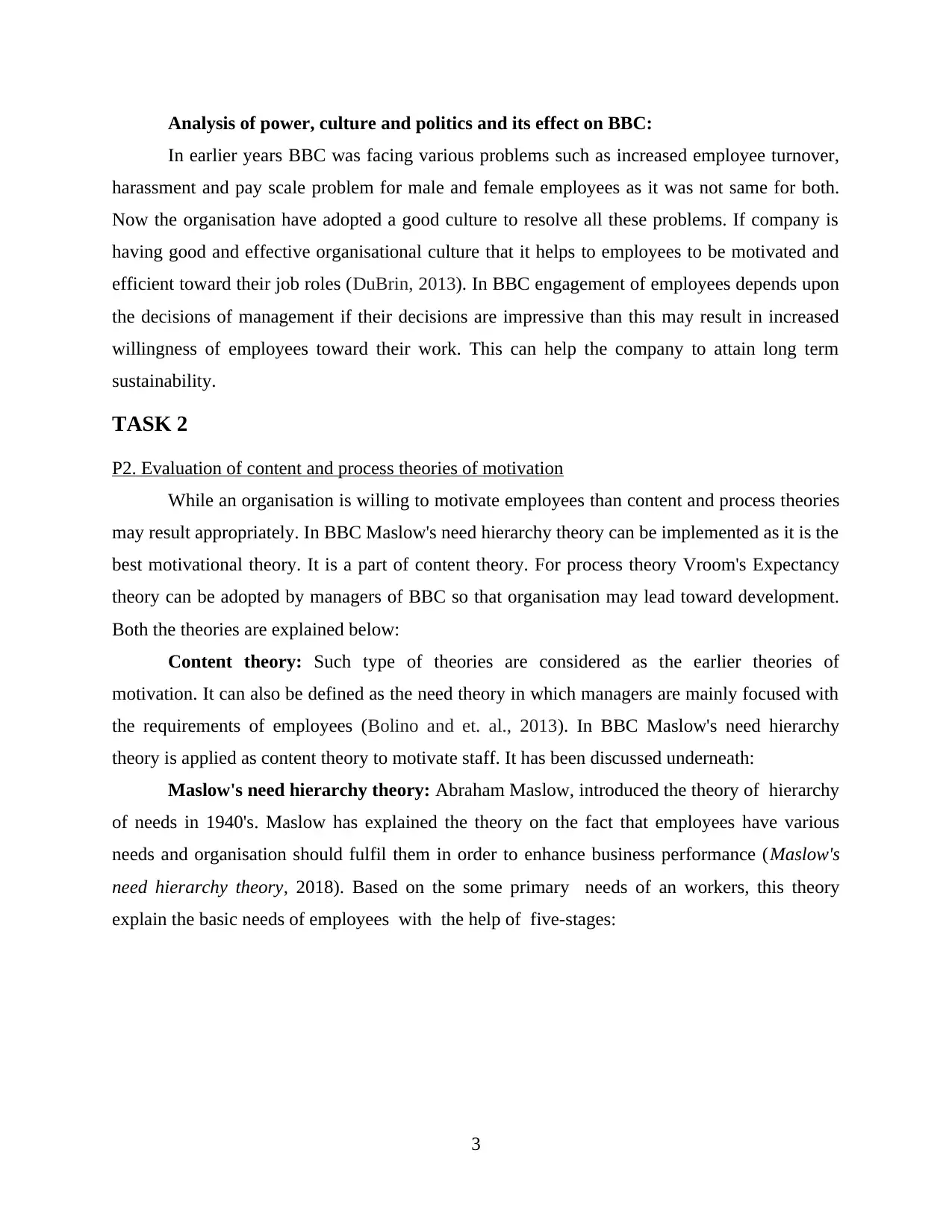
Analysis of power, culture and politics and its effect on BBC:
In earlier years BBC was facing various problems such as increased employee turnover,
harassment and pay scale problem for male and female employees as it was not same for both.
Now the organisation have adopted a good culture to resolve all these problems. If company is
having good and effective organisational culture that it helps to employees to be motivated and
efficient toward their job roles (DuBrin, 2013). In BBC engagement of employees depends upon
the decisions of management if their decisions are impressive than this may result in increased
willingness of employees toward their work. This can help the company to attain long term
sustainability.
TASK 2
P2. Evaluation of content and process theories of motivation
While an organisation is willing to motivate employees than content and process theories
may result appropriately. In BBC Maslow's need hierarchy theory can be implemented as it is the
best motivational theory. It is a part of content theory. For process theory Vroom's Expectancy
theory can be adopted by managers of BBC so that organisation may lead toward development.
Both the theories are explained below:
Content theory: Such type of theories are considered as the earlier theories of
motivation. It can also be defined as the need theory in which managers are mainly focused with
the requirements of employees (Bolino and et. al., 2013). In BBC Maslow's need hierarchy
theory is applied as content theory to motivate staff. It has been discussed underneath:
Maslow's need hierarchy theory: Abraham Maslow, introduced the theory of hierarchy
of needs in 1940's. Maslow has explained the theory on the fact that employees have various
needs and organisation should fulfil them in order to enhance business performance (Maslow's
need hierarchy theory, 2018). Based on the some primary needs of an workers, this theory
explain the basic needs of employees with the help of five-stages:
3
In earlier years BBC was facing various problems such as increased employee turnover,
harassment and pay scale problem for male and female employees as it was not same for both.
Now the organisation have adopted a good culture to resolve all these problems. If company is
having good and effective organisational culture that it helps to employees to be motivated and
efficient toward their job roles (DuBrin, 2013). In BBC engagement of employees depends upon
the decisions of management if their decisions are impressive than this may result in increased
willingness of employees toward their work. This can help the company to attain long term
sustainability.
TASK 2
P2. Evaluation of content and process theories of motivation
While an organisation is willing to motivate employees than content and process theories
may result appropriately. In BBC Maslow's need hierarchy theory can be implemented as it is the
best motivational theory. It is a part of content theory. For process theory Vroom's Expectancy
theory can be adopted by managers of BBC so that organisation may lead toward development.
Both the theories are explained below:
Content theory: Such type of theories are considered as the earlier theories of
motivation. It can also be defined as the need theory in which managers are mainly focused with
the requirements of employees (Bolino and et. al., 2013). In BBC Maslow's need hierarchy
theory is applied as content theory to motivate staff. It has been discussed underneath:
Maslow's need hierarchy theory: Abraham Maslow, introduced the theory of hierarchy
of needs in 1940's. Maslow has explained the theory on the fact that employees have various
needs and organisation should fulfil them in order to enhance business performance (Maslow's
need hierarchy theory, 2018). Based on the some primary needs of an workers, this theory
explain the basic needs of employees with the help of five-stages:
3
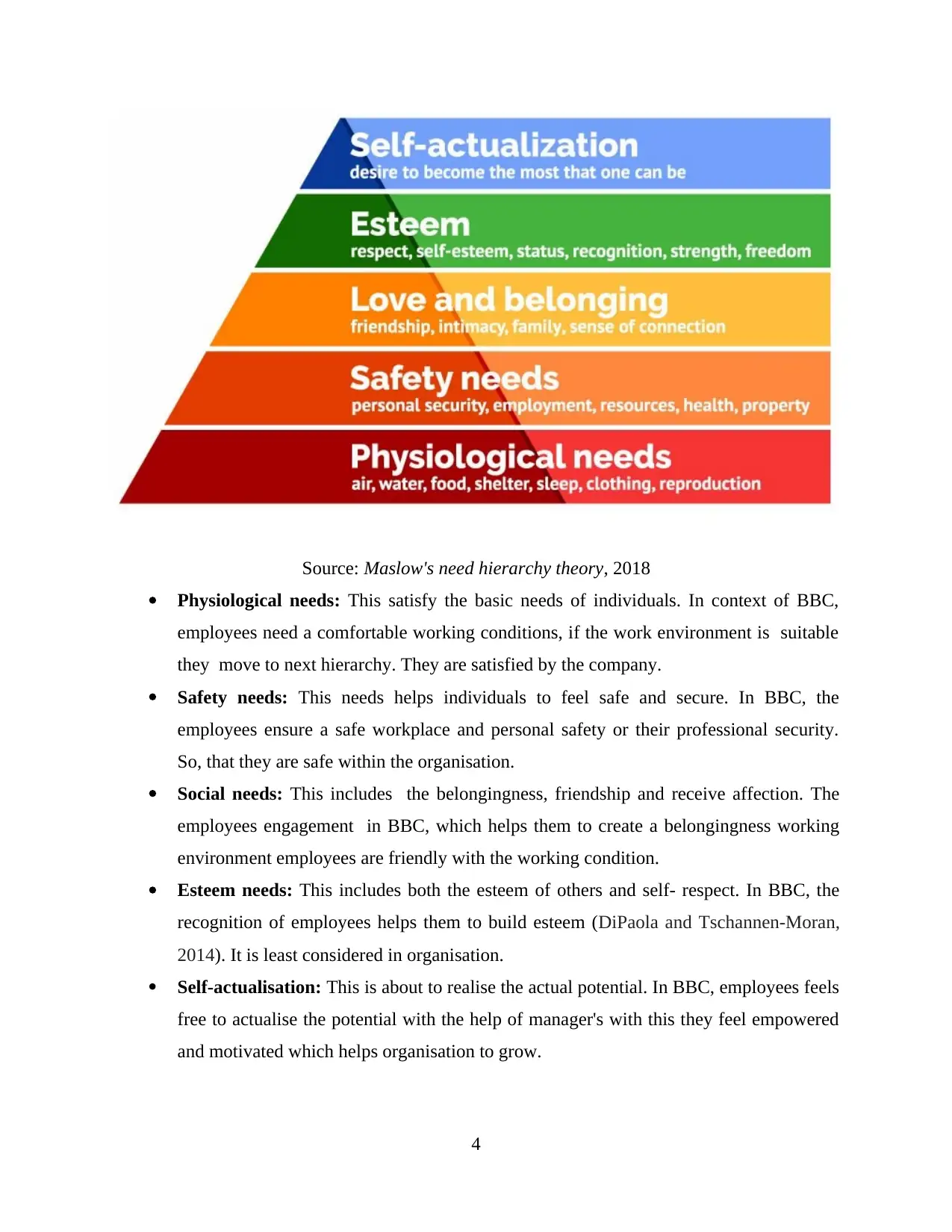
Source: Maslow's need hierarchy theory, 2018
Physiological needs: This satisfy the basic needs of individuals. In context of BBC,
employees need a comfortable working conditions, if the work environment is suitable
they move to next hierarchy. They are satisfied by the company.
Safety needs: This needs helps individuals to feel safe and secure. In BBC, the
employees ensure a safe workplace and personal safety or their professional security.
So, that they are safe within the organisation.
Social needs: This includes the belongingness, friendship and receive affection. The
employees engagement in BBC, which helps them to create a belongingness working
environment employees are friendly with the working condition.
Esteem needs: This includes both the esteem of others and self- respect. In BBC, the
recognition of employees helps them to build esteem (DiPaola and Tschannen-Moran,
2014). It is least considered in organisation.
Self-actualisation: This is about to realise the actual potential. In BBC, employees feels
free to actualise the potential with the help of manager's with this they feel empowered
and motivated which helps organisation to grow.
4
Physiological needs: This satisfy the basic needs of individuals. In context of BBC,
employees need a comfortable working conditions, if the work environment is suitable
they move to next hierarchy. They are satisfied by the company.
Safety needs: This needs helps individuals to feel safe and secure. In BBC, the
employees ensure a safe workplace and personal safety or their professional security.
So, that they are safe within the organisation.
Social needs: This includes the belongingness, friendship and receive affection. The
employees engagement in BBC, which helps them to create a belongingness working
environment employees are friendly with the working condition.
Esteem needs: This includes both the esteem of others and self- respect. In BBC, the
recognition of employees helps them to build esteem (DiPaola and Tschannen-Moran,
2014). It is least considered in organisation.
Self-actualisation: This is about to realise the actual potential. In BBC, employees feels
free to actualise the potential with the help of manager's with this they feel empowered
and motivated which helps organisation to grow.
4
⊘ This is a preview!⊘
Do you want full access?
Subscribe today to unlock all pages.

Trusted by 1+ million students worldwide
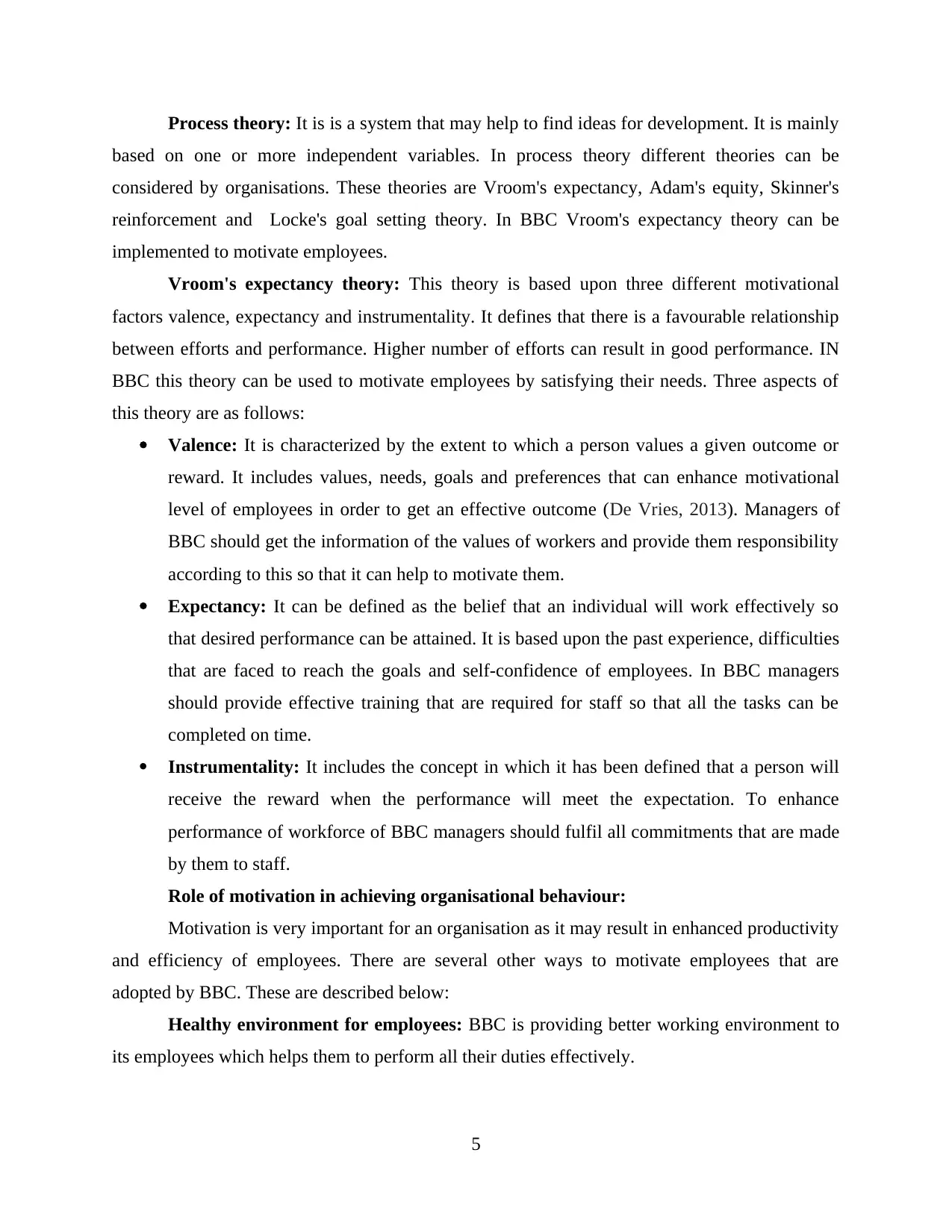
Process theory: It is is a system that may help to find ideas for development. It is mainly
based on one or more independent variables. In process theory different theories can be
considered by organisations. These theories are Vroom's expectancy, Adam's equity, Skinner's
reinforcement and Locke's goal setting theory. In BBC Vroom's expectancy theory can be
implemented to motivate employees.
Vroom's expectancy theory: This theory is based upon three different motivational
factors valence, expectancy and instrumentality. It defines that there is a favourable relationship
between efforts and performance. Higher number of efforts can result in good performance. IN
BBC this theory can be used to motivate employees by satisfying their needs. Three aspects of
this theory are as follows:
Valence: It is characterized by the extent to which a person values a given outcome or
reward. It includes values, needs, goals and preferences that can enhance motivational
level of employees in order to get an effective outcome (De Vries, 2013). Managers of
BBC should get the information of the values of workers and provide them responsibility
according to this so that it can help to motivate them.
Expectancy: It can be defined as the belief that an individual will work effectively so
that desired performance can be attained. It is based upon the past experience, difficulties
that are faced to reach the goals and self-confidence of employees. In BBC managers
should provide effective training that are required for staff so that all the tasks can be
completed on time.
Instrumentality: It includes the concept in which it has been defined that a person will
receive the reward when the performance will meet the expectation. To enhance
performance of workforce of BBC managers should fulfil all commitments that are made
by them to staff.
Role of motivation in achieving organisational behaviour:
Motivation is very important for an organisation as it may result in enhanced productivity
and efficiency of employees. There are several other ways to motivate employees that are
adopted by BBC. These are described below:
Healthy environment for employees: BBC is providing better working environment to
its employees which helps them to perform all their duties effectively.
5
based on one or more independent variables. In process theory different theories can be
considered by organisations. These theories are Vroom's expectancy, Adam's equity, Skinner's
reinforcement and Locke's goal setting theory. In BBC Vroom's expectancy theory can be
implemented to motivate employees.
Vroom's expectancy theory: This theory is based upon three different motivational
factors valence, expectancy and instrumentality. It defines that there is a favourable relationship
between efforts and performance. Higher number of efforts can result in good performance. IN
BBC this theory can be used to motivate employees by satisfying their needs. Three aspects of
this theory are as follows:
Valence: It is characterized by the extent to which a person values a given outcome or
reward. It includes values, needs, goals and preferences that can enhance motivational
level of employees in order to get an effective outcome (De Vries, 2013). Managers of
BBC should get the information of the values of workers and provide them responsibility
according to this so that it can help to motivate them.
Expectancy: It can be defined as the belief that an individual will work effectively so
that desired performance can be attained. It is based upon the past experience, difficulties
that are faced to reach the goals and self-confidence of employees. In BBC managers
should provide effective training that are required for staff so that all the tasks can be
completed on time.
Instrumentality: It includes the concept in which it has been defined that a person will
receive the reward when the performance will meet the expectation. To enhance
performance of workforce of BBC managers should fulfil all commitments that are made
by them to staff.
Role of motivation in achieving organisational behaviour:
Motivation is very important for an organisation as it may result in enhanced productivity
and efficiency of employees. There are several other ways to motivate employees that are
adopted by BBC. These are described below:
Healthy environment for employees: BBC is providing better working environment to
its employees which helps them to perform all their duties effectively.
5
Paraphrase This Document
Need a fresh take? Get an instant paraphrase of this document with our AI Paraphraser
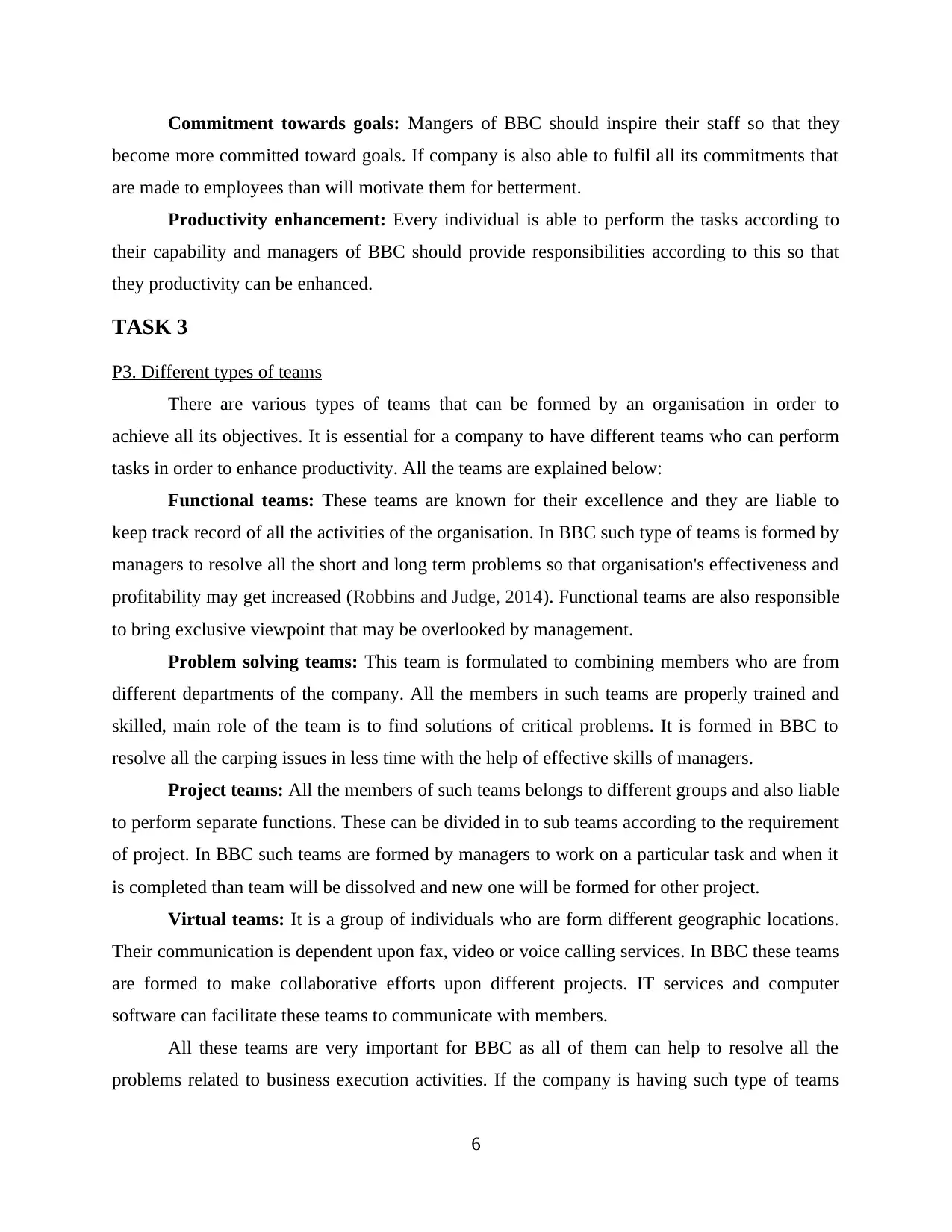
Commitment towards goals: Mangers of BBC should inspire their staff so that they
become more committed toward goals. If company is also able to fulfil all its commitments that
are made to employees than will motivate them for betterment.
Productivity enhancement: Every individual is able to perform the tasks according to
their capability and managers of BBC should provide responsibilities according to this so that
they productivity can be enhanced.
TASK 3
P3. Different types of teams
There are various types of teams that can be formed by an organisation in order to
achieve all its objectives. It is essential for a company to have different teams who can perform
tasks in order to enhance productivity. All the teams are explained below:
Functional teams: These teams are known for their excellence and they are liable to
keep track record of all the activities of the organisation. In BBC such type of teams is formed by
managers to resolve all the short and long term problems so that organisation's effectiveness and
profitability may get increased (Robbins and Judge, 2014). Functional teams are also responsible
to bring exclusive viewpoint that may be overlooked by management.
Problem solving teams: This team is formulated to combining members who are from
different departments of the company. All the members in such teams are properly trained and
skilled, main role of the team is to find solutions of critical problems. It is formed in BBC to
resolve all the carping issues in less time with the help of effective skills of managers.
Project teams: All the members of such teams belongs to different groups and also liable
to perform separate functions. These can be divided in to sub teams according to the requirement
of project. In BBC such teams are formed by managers to work on a particular task and when it
is completed than team will be dissolved and new one will be formed for other project.
Virtual teams: It is a group of individuals who are form different geographic locations.
Their communication is dependent upon fax, video or voice calling services. In BBC these teams
are formed to make collaborative efforts upon different projects. IT services and computer
software can facilitate these teams to communicate with members.
All these teams are very important for BBC as all of them can help to resolve all the
problems related to business execution activities. If the company is having such type of teams
6
become more committed toward goals. If company is also able to fulfil all its commitments that
are made to employees than will motivate them for betterment.
Productivity enhancement: Every individual is able to perform the tasks according to
their capability and managers of BBC should provide responsibilities according to this so that
they productivity can be enhanced.
TASK 3
P3. Different types of teams
There are various types of teams that can be formed by an organisation in order to
achieve all its objectives. It is essential for a company to have different teams who can perform
tasks in order to enhance productivity. All the teams are explained below:
Functional teams: These teams are known for their excellence and they are liable to
keep track record of all the activities of the organisation. In BBC such type of teams is formed by
managers to resolve all the short and long term problems so that organisation's effectiveness and
profitability may get increased (Robbins and Judge, 2014). Functional teams are also responsible
to bring exclusive viewpoint that may be overlooked by management.
Problem solving teams: This team is formulated to combining members who are from
different departments of the company. All the members in such teams are properly trained and
skilled, main role of the team is to find solutions of critical problems. It is formed in BBC to
resolve all the carping issues in less time with the help of effective skills of managers.
Project teams: All the members of such teams belongs to different groups and also liable
to perform separate functions. These can be divided in to sub teams according to the requirement
of project. In BBC such teams are formed by managers to work on a particular task and when it
is completed than team will be dissolved and new one will be formed for other project.
Virtual teams: It is a group of individuals who are form different geographic locations.
Their communication is dependent upon fax, video or voice calling services. In BBC these teams
are formed to make collaborative efforts upon different projects. IT services and computer
software can facilitate these teams to communicate with members.
All these teams are very important for BBC as all of them can help to resolve all the
problems related to business execution activities. If the company is having such type of teams
6
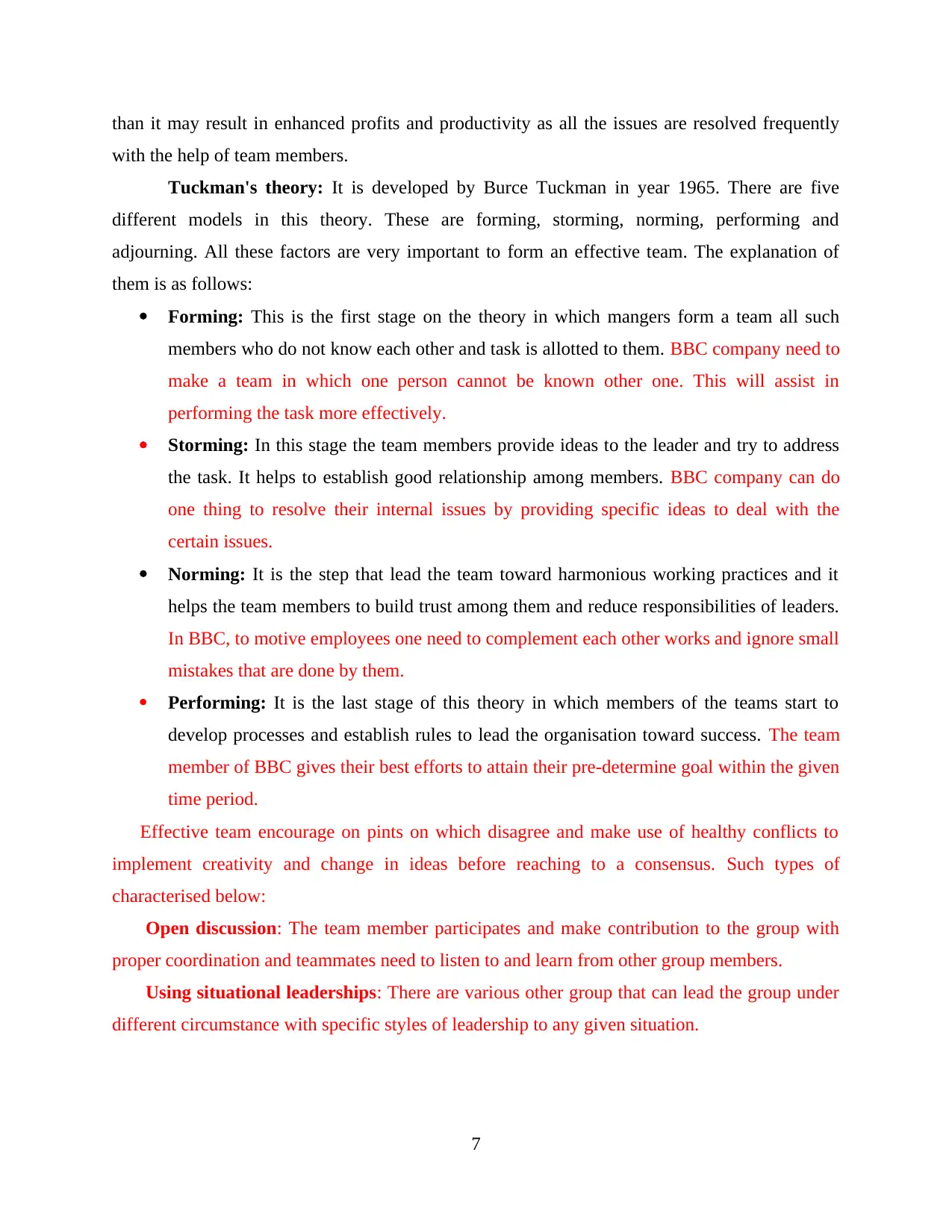
than it may result in enhanced profits and productivity as all the issues are resolved frequently
with the help of team members.
Tuckman's theory: It is developed by Burce Tuckman in year 1965. There are five
different models in this theory. These are forming, storming, norming, performing and
adjourning. All these factors are very important to form an effective team. The explanation of
them is as follows:
Forming: This is the first stage on the theory in which mangers form a team all such
members who do not know each other and task is allotted to them. BBC company need to
make a team in which one person cannot be known other one. This will assist in
performing the task more effectively.
Storming: In this stage the team members provide ideas to the leader and try to address
the task. It helps to establish good relationship among members. BBC company can do
one thing to resolve their internal issues by providing specific ideas to deal with the
certain issues.
Norming: It is the step that lead the team toward harmonious working practices and it
helps the team members to build trust among them and reduce responsibilities of leaders.
In BBC, to motive employees one need to complement each other works and ignore small
mistakes that are done by them.
Performing: It is the last stage of this theory in which members of the teams start to
develop processes and establish rules to lead the organisation toward success. The team
member of BBC gives their best efforts to attain their pre-determine goal within the given
time period.
Effective team encourage on pints on which disagree and make use of healthy conflicts to
implement creativity and change in ideas before reaching to a consensus. Such types of
characterised below:
Open discussion: The team member participates and make contribution to the group with
proper coordination and teammates need to listen to and learn from other group members.
Using situational leaderships: There are various other group that can lead the group under
different circumstance with specific styles of leadership to any given situation.
7
with the help of team members.
Tuckman's theory: It is developed by Burce Tuckman in year 1965. There are five
different models in this theory. These are forming, storming, norming, performing and
adjourning. All these factors are very important to form an effective team. The explanation of
them is as follows:
Forming: This is the first stage on the theory in which mangers form a team all such
members who do not know each other and task is allotted to them. BBC company need to
make a team in which one person cannot be known other one. This will assist in
performing the task more effectively.
Storming: In this stage the team members provide ideas to the leader and try to address
the task. It helps to establish good relationship among members. BBC company can do
one thing to resolve their internal issues by providing specific ideas to deal with the
certain issues.
Norming: It is the step that lead the team toward harmonious working practices and it
helps the team members to build trust among them and reduce responsibilities of leaders.
In BBC, to motive employees one need to complement each other works and ignore small
mistakes that are done by them.
Performing: It is the last stage of this theory in which members of the teams start to
develop processes and establish rules to lead the organisation toward success. The team
member of BBC gives their best efforts to attain their pre-determine goal within the given
time period.
Effective team encourage on pints on which disagree and make use of healthy conflicts to
implement creativity and change in ideas before reaching to a consensus. Such types of
characterised below:
Open discussion: The team member participates and make contribution to the group with
proper coordination and teammates need to listen to and learn from other group members.
Using situational leaderships: There are various other group that can lead the group under
different circumstance with specific styles of leadership to any given situation.
7
⊘ This is a preview!⊘
Do you want full access?
Subscribe today to unlock all pages.

Trusted by 1+ million students worldwide
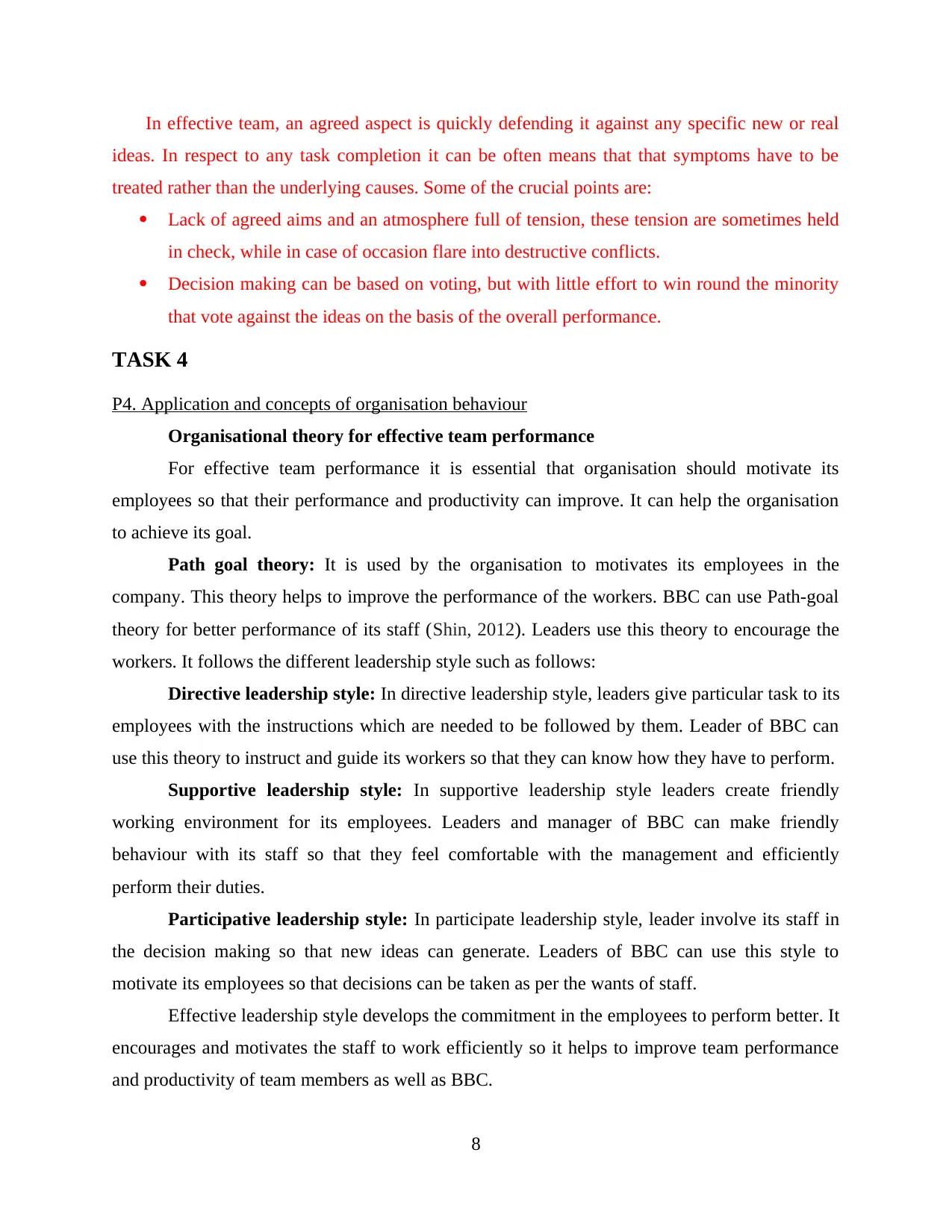
In effective team, an agreed aspect is quickly defending it against any specific new or real
ideas. In respect to any task completion it can be often means that that symptoms have to be
treated rather than the underlying causes. Some of the crucial points are:
Lack of agreed aims and an atmosphere full of tension, these tension are sometimes held
in check, while in case of occasion flare into destructive conflicts.
Decision making can be based on voting, but with little effort to win round the minority
that vote against the ideas on the basis of the overall performance.
TASK 4
P4. Application and concepts of organisation behaviour
Organisational theory for effective team performance
For effective team performance it is essential that organisation should motivate its
employees so that their performance and productivity can improve. It can help the organisation
to achieve its goal.
Path goal theory: It is used by the organisation to motivates its employees in the
company. This theory helps to improve the performance of the workers. BBC can use Path-goal
theory for better performance of its staff (Shin, 2012). Leaders use this theory to encourage the
workers. It follows the different leadership style such as follows:
Directive leadership style: In directive leadership style, leaders give particular task to its
employees with the instructions which are needed to be followed by them. Leader of BBC can
use this theory to instruct and guide its workers so that they can know how they have to perform.
Supportive leadership style: In supportive leadership style leaders create friendly
working environment for its employees. Leaders and manager of BBC can make friendly
behaviour with its staff so that they feel comfortable with the management and efficiently
perform their duties.
Participative leadership style: In participate leadership style, leader involve its staff in
the decision making so that new ideas can generate. Leaders of BBC can use this style to
motivate its employees so that decisions can be taken as per the wants of staff.
Effective leadership style develops the commitment in the employees to perform better. It
encourages and motivates the staff to work efficiently so it helps to improve team performance
and productivity of team members as well as BBC.
8
ideas. In respect to any task completion it can be often means that that symptoms have to be
treated rather than the underlying causes. Some of the crucial points are:
Lack of agreed aims and an atmosphere full of tension, these tension are sometimes held
in check, while in case of occasion flare into destructive conflicts.
Decision making can be based on voting, but with little effort to win round the minority
that vote against the ideas on the basis of the overall performance.
TASK 4
P4. Application and concepts of organisation behaviour
Organisational theory for effective team performance
For effective team performance it is essential that organisation should motivate its
employees so that their performance and productivity can improve. It can help the organisation
to achieve its goal.
Path goal theory: It is used by the organisation to motivates its employees in the
company. This theory helps to improve the performance of the workers. BBC can use Path-goal
theory for better performance of its staff (Shin, 2012). Leaders use this theory to encourage the
workers. It follows the different leadership style such as follows:
Directive leadership style: In directive leadership style, leaders give particular task to its
employees with the instructions which are needed to be followed by them. Leader of BBC can
use this theory to instruct and guide its workers so that they can know how they have to perform.
Supportive leadership style: In supportive leadership style leaders create friendly
working environment for its employees. Leaders and manager of BBC can make friendly
behaviour with its staff so that they feel comfortable with the management and efficiently
perform their duties.
Participative leadership style: In participate leadership style, leader involve its staff in
the decision making so that new ideas can generate. Leaders of BBC can use this style to
motivate its employees so that decisions can be taken as per the wants of staff.
Effective leadership style develops the commitment in the employees to perform better. It
encourages and motivates the staff to work efficiently so it helps to improve team performance
and productivity of team members as well as BBC.
8
Paraphrase This Document
Need a fresh take? Get an instant paraphrase of this document with our AI Paraphraser
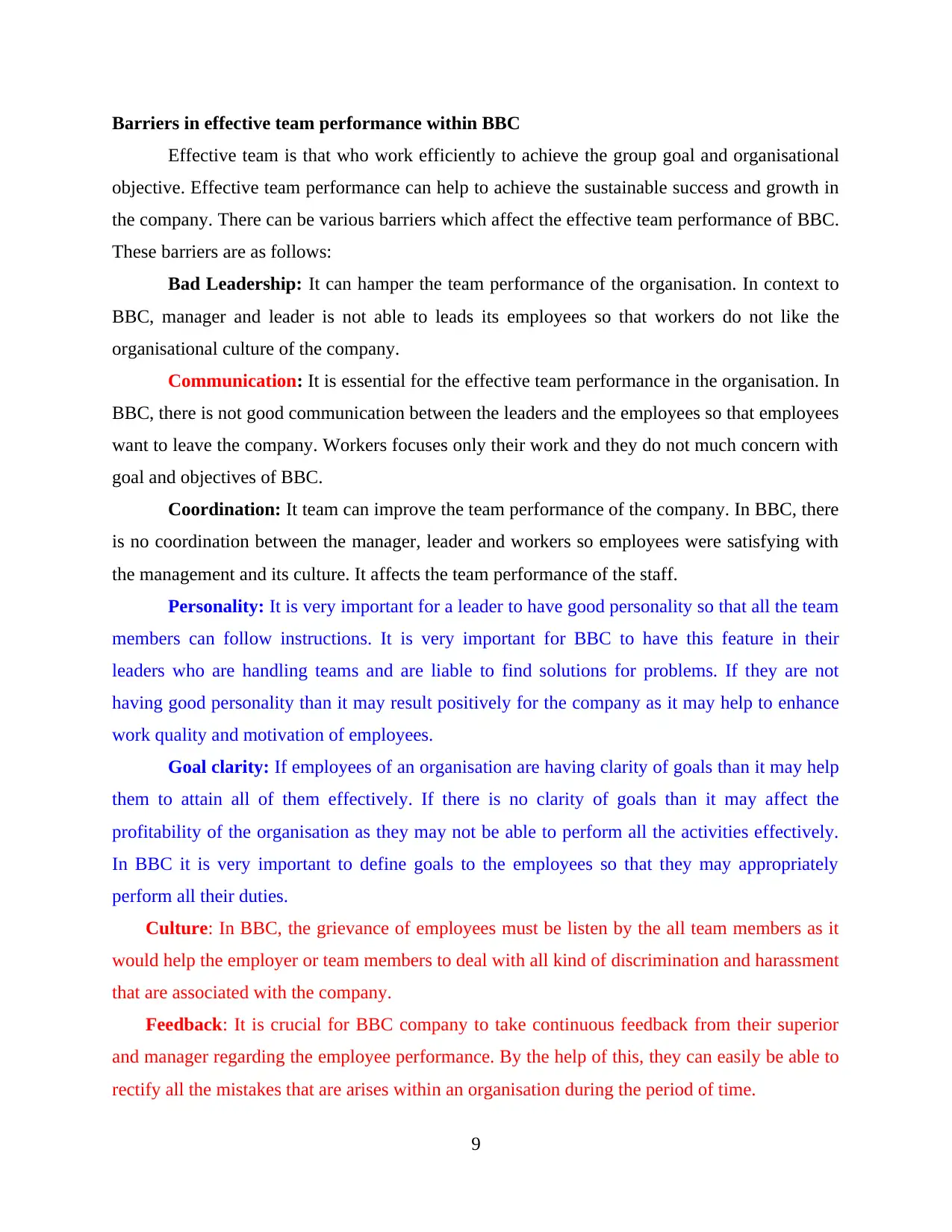
Barriers in effective team performance within BBC
Effective team is that who work efficiently to achieve the group goal and organisational
objective. Effective team performance can help to achieve the sustainable success and growth in
the company. There can be various barriers which affect the effective team performance of BBC.
These barriers are as follows:
Bad Leadership: It can hamper the team performance of the organisation. In context to
BBC, manager and leader is not able to leads its employees so that workers do not like the
organisational culture of the company.
Communication: It is essential for the effective team performance in the organisation. In
BBC, there is not good communication between the leaders and the employees so that employees
want to leave the company. Workers focuses only their work and they do not much concern with
goal and objectives of BBC.
Coordination: It team can improve the team performance of the company. In BBC, there
is no coordination between the manager, leader and workers so employees were satisfying with
the management and its culture. It affects the team performance of the staff.
Personality: It is very important for a leader to have good personality so that all the team
members can follow instructions. It is very important for BBC to have this feature in their
leaders who are handling teams and are liable to find solutions for problems. If they are not
having good personality than it may result positively for the company as it may help to enhance
work quality and motivation of employees.
Goal clarity: If employees of an organisation are having clarity of goals than it may help
them to attain all of them effectively. If there is no clarity of goals than it may affect the
profitability of the organisation as they may not be able to perform all the activities effectively.
In BBC it is very important to define goals to the employees so that they may appropriately
perform all their duties.
Culture: In BBC, the grievance of employees must be listen by the all team members as it
would help the employer or team members to deal with all kind of discrimination and harassment
that are associated with the company.
Feedback: It is crucial for BBC company to take continuous feedback from their superior
and manager regarding the employee performance. By the help of this, they can easily be able to
rectify all the mistakes that are arises within an organisation during the period of time.
9
Effective team is that who work efficiently to achieve the group goal and organisational
objective. Effective team performance can help to achieve the sustainable success and growth in
the company. There can be various barriers which affect the effective team performance of BBC.
These barriers are as follows:
Bad Leadership: It can hamper the team performance of the organisation. In context to
BBC, manager and leader is not able to leads its employees so that workers do not like the
organisational culture of the company.
Communication: It is essential for the effective team performance in the organisation. In
BBC, there is not good communication between the leaders and the employees so that employees
want to leave the company. Workers focuses only their work and they do not much concern with
goal and objectives of BBC.
Coordination: It team can improve the team performance of the company. In BBC, there
is no coordination between the manager, leader and workers so employees were satisfying with
the management and its culture. It affects the team performance of the staff.
Personality: It is very important for a leader to have good personality so that all the team
members can follow instructions. It is very important for BBC to have this feature in their
leaders who are handling teams and are liable to find solutions for problems. If they are not
having good personality than it may result positively for the company as it may help to enhance
work quality and motivation of employees.
Goal clarity: If employees of an organisation are having clarity of goals than it may help
them to attain all of them effectively. If there is no clarity of goals than it may affect the
profitability of the organisation as they may not be able to perform all the activities effectively.
In BBC it is very important to define goals to the employees so that they may appropriately
perform all their duties.
Culture: In BBC, the grievance of employees must be listen by the all team members as it
would help the employer or team members to deal with all kind of discrimination and harassment
that are associated with the company.
Feedback: It is crucial for BBC company to take continuous feedback from their superior
and manager regarding the employee performance. By the help of this, they can easily be able to
rectify all the mistakes that are arises within an organisation during the period of time.
9
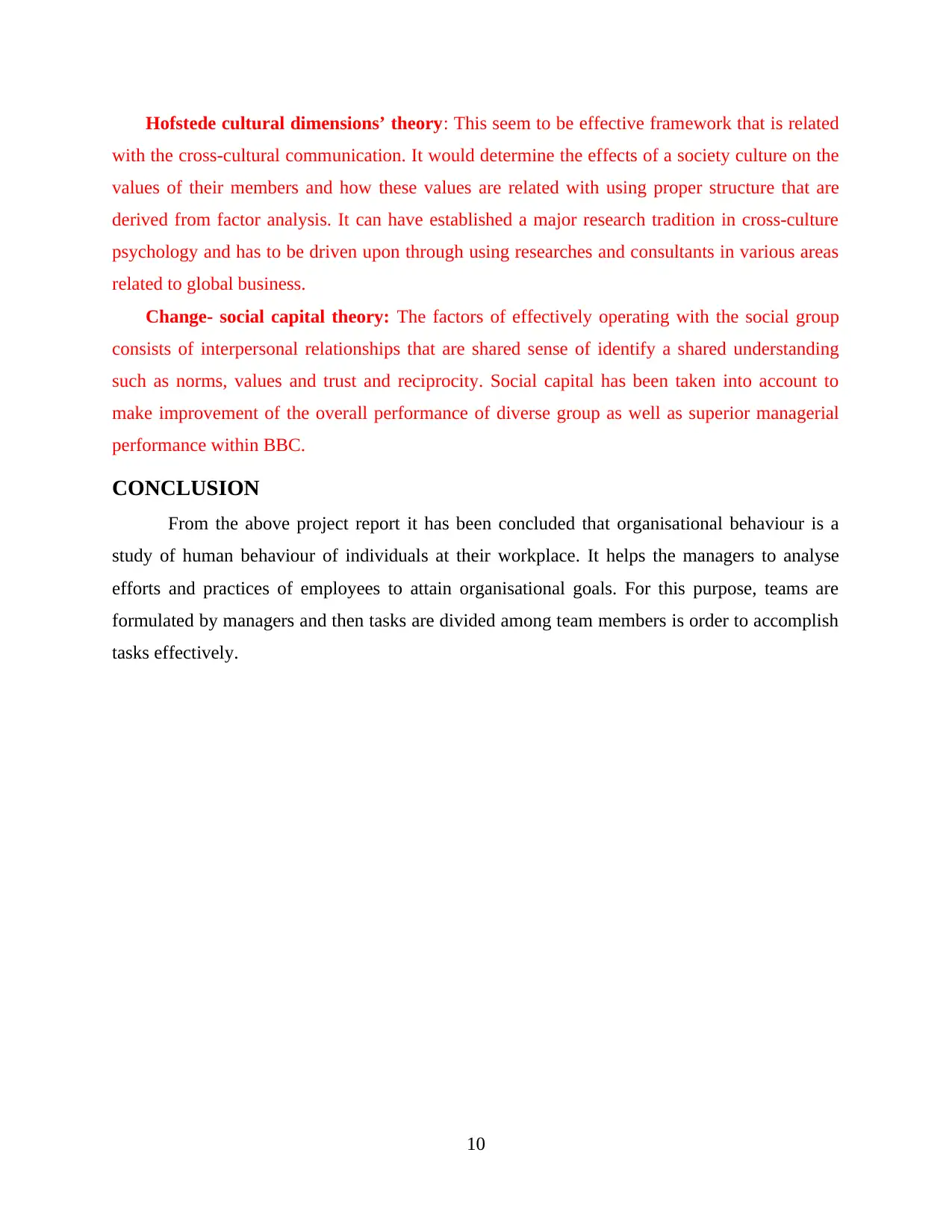
Hofstede cultural dimensions’ theory: This seem to be effective framework that is related
with the cross-cultural communication. It would determine the effects of a society culture on the
values of their members and how these values are related with using proper structure that are
derived from factor analysis. It can have established a major research tradition in cross-culture
psychology and has to be driven upon through using researches and consultants in various areas
related to global business.
Change- social capital theory: The factors of effectively operating with the social group
consists of interpersonal relationships that are shared sense of identify a shared understanding
such as norms, values and trust and reciprocity. Social capital has been taken into account to
make improvement of the overall performance of diverse group as well as superior managerial
performance within BBC.
CONCLUSION
From the above project report it has been concluded that organisational behaviour is a
study of human behaviour of individuals at their workplace. It helps the managers to analyse
efforts and practices of employees to attain organisational goals. For this purpose, teams are
formulated by managers and then tasks are divided among team members is order to accomplish
tasks effectively.
10
with the cross-cultural communication. It would determine the effects of a society culture on the
values of their members and how these values are related with using proper structure that are
derived from factor analysis. It can have established a major research tradition in cross-culture
psychology and has to be driven upon through using researches and consultants in various areas
related to global business.
Change- social capital theory: The factors of effectively operating with the social group
consists of interpersonal relationships that are shared sense of identify a shared understanding
such as norms, values and trust and reciprocity. Social capital has been taken into account to
make improvement of the overall performance of diverse group as well as superior managerial
performance within BBC.
CONCLUSION
From the above project report it has been concluded that organisational behaviour is a
study of human behaviour of individuals at their workplace. It helps the managers to analyse
efforts and practices of employees to attain organisational goals. For this purpose, teams are
formulated by managers and then tasks are divided among team members is order to accomplish
tasks effectively.
10
⊘ This is a preview!⊘
Do you want full access?
Subscribe today to unlock all pages.

Trusted by 1+ million students worldwide
1 out of 13
Related Documents
Your All-in-One AI-Powered Toolkit for Academic Success.
+13062052269
info@desklib.com
Available 24*7 on WhatsApp / Email
![[object Object]](/_next/static/media/star-bottom.7253800d.svg)
Unlock your academic potential
Copyright © 2020–2025 A2Z Services. All Rights Reserved. Developed and managed by ZUCOL.





